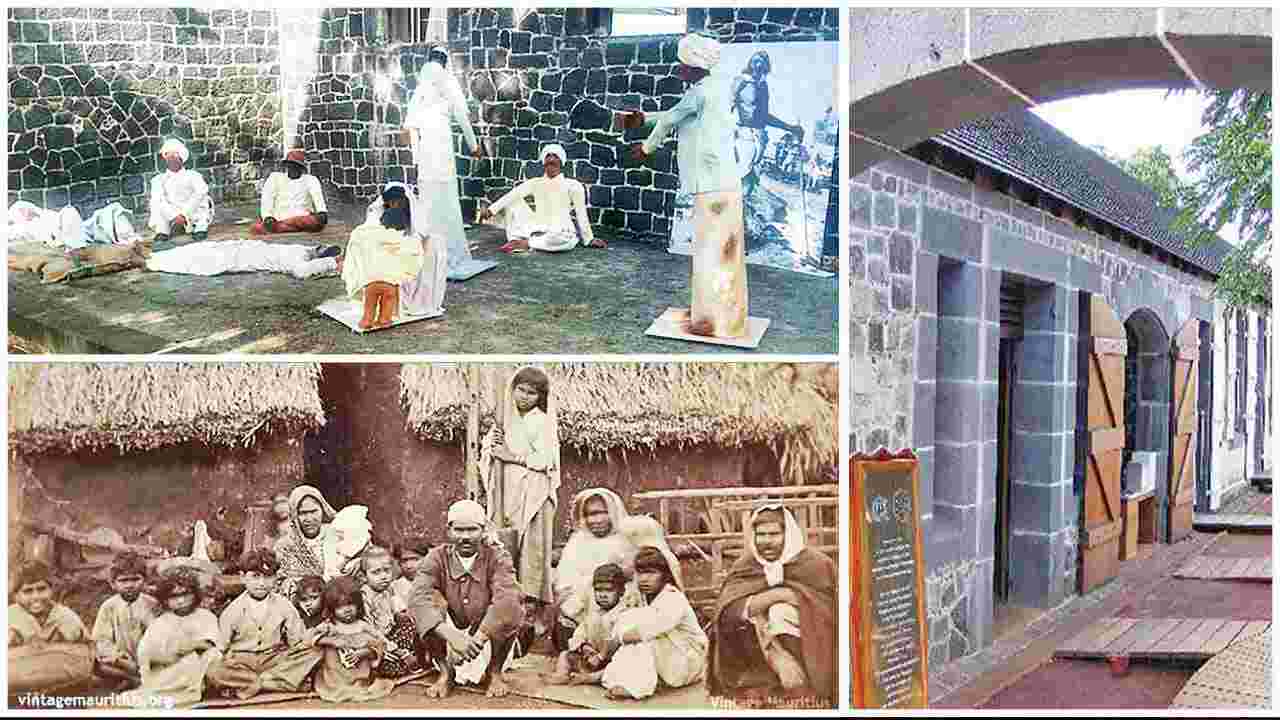
Recorded history has it that indentured labourers, known as coolies, arrived in Mauritius on the 2 November 1834. This week marks the 182nd anniversary of this first arrival. The indenture system, introduced following the abolition of slavery across all British colonies, was known as the “Great Experiment” and saw the displacement of hundreds of thousands of Indians. Initially launched in Mauritius, it was later extended to other British colonies.
The Prime Minister, Sir Anerood Jugnauth, exhorted the youth to adopt the values transmitted by our ancestors and follow their steps, by living a life with dignity, respect and humility for a better future which will eventually help the country prosper. He was speaking on Wednesday at the celebrations of the 182nd anniversary of the arrival of indentured labourers in Mauritius at the Aapravasi Ghat, in Port-Louis.
Sir Anerood Jugnauth paid tribute to the first 36 immigrants, who through perseverance, resilience and fortitude contributed significantly to make of Mauritius where it stands today. He further underscored that despite the huge sacrifices and moments of hardships, our ancestors persevered and did not let go of their culture, which he said, should serve as example for the younger generation.
The chairman of the AGTF, Dharam Yash Deo Dhuny told guests, during the ceremony, of the works done on the site to the satisfaction of UNESCO who has made of it a World Heritage in 2006. Mr Dhuny revealed that Mauritius will soon host a world scientific meeting on this project, resembling that of the ‘Slave Route’ launched by UNESCO in 2014. This meeting will include representatives of 15 countries where Indian immigrants worked and settled.
 Indentured Labour
Indentured Labour
The Indentured labourers were mostly from India’s state of Bihar. They came after the abolition of slavery in the British Colonies – Mauritius, Guyana, Surinam, and Trinidad, to replace the African Slaves. In Mauritius, 68,413 slaves were freed out of a total population of 101,469 people with a compensation of 2,112,632 pounds and 10 shillings was given to slave owners. Former slaves cost 50 pounds yearly in terms of wages while indentured labourers, deprived from common rights and treated as slaves, cost only 3 pounds a year and were given a salary of Rs 5 per month.
Indentured labourers coming from India was a source of cheap labour to work in the sugar cane plantations. In less than a century they changed the face of Mauritius into a prosperous sugar producing country.
The first batch of 137 Indians who came on the island was a group of artisans from Pondicherry in 1740 during the Governorship of Mahé de Labourdonnais. The 2nd batch, of about 700, came as soldiers who took part in the battle between the British and the French in December 1810; most of them were from Madras, Bengal and Bihar, including some prisoners who revolted against the British Rule in India. The 3rd group who arrived here from 1834 to 1838 was a batch of 68,613 of Indentured Labourers; the 4th batch from 1843 to 1861 was four times more – 200,000 in a total population of about 300,000. The 5th and last batch of 1,500 came in 1923 making a total of 451,776 Indians who migrated to Mauritius. 157,639 of these Indians left after their five to ten year contract ended, whilst the remaining 294,137 stayed behind.
Conditions of work contract:
- A contract of 5 years
- Three pounds per year or Rs 5 per month
- A percentage from the Rs 5 per month was deducted for the cost of their voyage from India to Mauritius
- At the end of their contract they supposedly had the option to return to India but owners often succeeded in eliminating their choice of return
- Many plantation owners punished the workers by beating them, hunting those who ran away and imprisoned them
- They had to work every-day, except Sunday, from sunrise to sunset
- The double cut implied if a labourer who was absent for 1 day, the employers would cut two days of salary.
Freedom Fighters
Two great personalities who fought for the emancipation of Indian Indentured Labourers were Adolphe Von de Plevitz and Manilall Maganlall Doctor. Adolphe Von de Plevitz was a Prussian (now Germany), planter in the District of Moka, he treated his Indian Labourers well, while most other planters treated them as slaves. He had a petition signed by 9,401 Indian labourers and sent the petition to the Secretary of State of Great Britain asking for a Royal Commission to look upon the grievances of the Indian labourers.
Finally, a Royal Commission arrived in 1872 comprising of two Commissioners, William Edward Frere and Victor Alexander Williamson. The Royal Commission of 1872 gave some good privileges in favour of the Indian Labourers.
In 1901, Mohandas Gandhi visited Mauritius and in 1907 he sent one of his Lieutenants, Manilall Doctor, to defend the interest of the Indian labourers in Mauritius. Holder of MA and LLB degrees, Manilall Doctor arrived in Mauritius on the 11 October 1907. When he came, the Indian community had no leader of its own, so he was the first Indian to appear at the Mauritian Bar and is remembered as a courageous fighter who defended the cause of Indian labourers and small planters.
Manilall Doctor’s name is generally associated with Action Liberal and the Royal Commission of 1909. He transcended the communal barrier to make common cause with non Indians who in return supported his cause. Action Liberal was founded by Mauritians like Dr Eugene Laurent, Edouard Nairac, Anatole de Boucherville and Goolam Mamode Issac in 1906.
Manilall Doctor deponed before the 3rd Royal Commission. Amongst his demands before the third Royal Commission of 1909 were:
- To nominate English Magistrates
- Human treatment towards Hindu labourers
- Strict control in regards to the sugar cane tonnage for small planters
- To establish an Agricultural Bank
- To legalize Hindu marriage so that children born could become legal heirs
- Introduction of the Hindu culture
- Introduction of the Hindi language in schools
- To establish a co-operative bank
- To reform the legislation regarding indentured labourers
- To reduce the salary of the Governor of Mauritius from Rs 75,000 to Rs 50,000 per year (at that time indentured labourers were earning Rs 5 per month or Rs 60 per year).
 With contribution from
With contribution from
Lutchmeeparsadsingh Ramsahok,
leader of Parti Action Liberal.
 J'aime
J'aime














